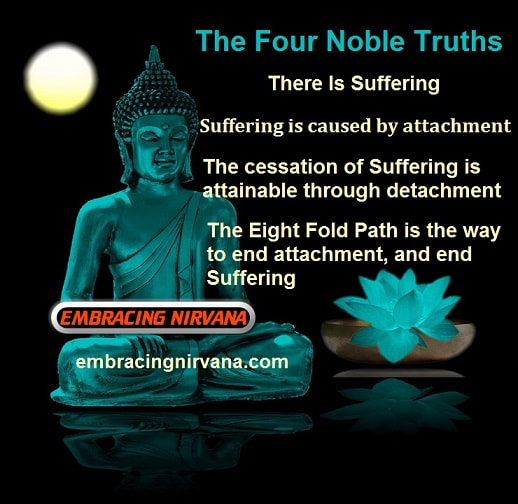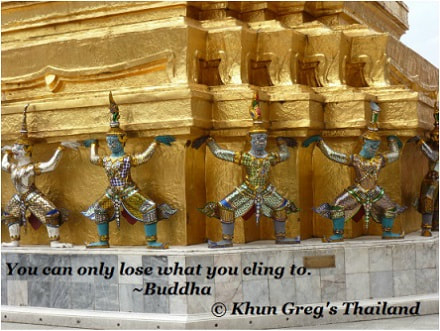What are the Four Noble Truths?
The four Noble Truths:
1 The truth of suffering. (Dukkha) There is suffering. Life is suffering.
2 The truth of the cause of suffering. (Samudaya) Suffering is caused by attachment to desires.
3 The truth of an end to suffering. (Nirhodha) Suffering can be overcome, and happiness attained by overcoming attachment to desires.
4 The truth of the eightfold path that frees us from suffering. (Magga) Following the steps of the eightfold path is the way to end attachment and end suffering.
The First Noble Truth:
Dukkha is a Pali word that means anything that is unpleasant and causes suffering. It also refers to the realities of life that include feelings of, distress, sorrow, grief, and pain, both mental as well as physical.
The first noble truth is simply that life is suffering. We humans all suffer in one way, or another. (“All beings have their suffering. Some suffer too little, some suffer too much.” - Buddha)
Our birth is suffering. When you are born the first thing the doctor does is smack your butt to make you cry so that you start breathing, although most would agree that it is our mothers who suffer more through physical pain at the moment of our birth.
Birth is suffering.
We will all become sick in our lives, from a simple cold that causes discomfort, to more serious illnesses such as cancer that cause more pain.
Sickness is suffering.
No matter rich, or poor all beings will feel pain when injured. Being in an accident, falling and breaking a bone, or being injured by another all cause pain.
Injuries are suffering.
The death of a loved one will cause emotional pain for all who experience it. We all know that death is inevitable, and all things are impermanent, but we still feel pain when someone close to us passes away.
The loss of a loved one is suffering.
Even in our own death there is suffering. There could be physical suffering from illness, or injuries that are leading to our passing, or emotional suffering from not knowing what truly lies beyond the physical plane, and where we will find ourselves upon our passing.
Death is suffering.
The answers for why we suffer are found in Buddha’s Second Noble Truth.
The Second Noble Truth:
Samudaya which simply means the cause of suffering is attachment to desire. (Tanha)
Our attachment to things we desire are the cause of our suffering. Our suffering comes from not letting go of that which we cling to.
We all crave experiences that we find pleasing, and for some of us these experiences lead us down a dark path of addiction such as with alcohol, and drug abuse. When we are addicted to experiences even harmless ones we cling to them, and don’t want them to end. All things are impermanent, and nothing lasts forever, even situations must change, and our desire to hold on to them leads to suffering.
Our attachment to desire for material things also causes us suffering. Young children experience this when they are in a retail store with their parents. While shopping with their parents a child inevitably finds a toy, or item that they feel they must have, and they will tell their parents that they want it. We all know what happens if the parents refuse to buy them what they want. They, yell, scream, cry, and throw a temper tantrum. They feel suffering caused by being attached to the toy they desire.
People will continue to become attached to material items as they grow older as well. Smart phones are a popular item today, and many people have them. There are many people who are addicted to social media, and use their smart phones to access the popular platforms. Some people seem to always have their phones in their hand staring at the screen as the tap away on it totally oblivious to what’s going on around them. They are attached to their smart phone as well as the way they interact with it.
If their smart phones are lost, stolen, or damaged they feel lost without their precious smart phones. This will cause them stress, or may even leave them in tears. Their attachment to their smart phone is the cause of their suffering.
The car you love will age, and deteriorate, or may be involved in an accident. Your favorite book, or a cherished photo will show signs of foxing with age. Nothing lasts forever. When we want, and are attached to material things, we have a negative emotional response to losing them. This negative emotional response causes us suffering.
If we were not attached to that which we desire we would have no negative emotions upon losing them. This desire includes material wants, desire for sensual pleasure, and desire to create more for ourselves.
Buddha also talked about the ignorance of the power that desire has over us. When we realize that our wants, and desires are the root cause of our suffering we move on to the third noble truth.
Third Noble Truth:
Buddha’s third noble truth is that there is freedom from suffering. Letting go of your attachment of that which you are afraid to lose is the path to enlightenment. The enlightened being has successfully released themselves from cravings, desires, and attachment, and has achieved a state of Nirvana.
We now know that life is suffering, and the cause of that suffering is ignorance, and attachment to desires. We know that Buddha taught that there is a path to freedom from suffering. The steps we must take along this path are outlined in Buddha’s fourth Noble truths.
Fourth Noble Truth:
The path Buddha discovered to end suffering, and achieve Nirvana is the middle path, the path between the two extremes. The first extreme is one of luxury, and indulgence. The second extreme is asceticism, or the discipline to avoid all forms of indulgence including food.
The middle path is the Eightfold path to enlightenment... Nirvana.
The Eightfold Path is:
1. Right Understanding: The wisdom to know ourselves, and everything around us.
2. Right Thought: Your thoughts, and intentions must be of a positive, and of a pure nature.
3. Right Speech: You words, and speech must be of a positive, compassionate, and uplifting nature both when dealing with others, and yourself.
4. Right Action: Your actions must be helpful, and compassionate, not hurtful.
5. Right livelihood: Make your living in an honest way.
6. Right Effort: You must put energy, and effort into achieving wholesome states.
7. Right mindfulness: Be aware of what you are doing, and focus your thoughts in the present moment.
8. Right Concentration: This is often associated with meditation, and training to focus your attention on one thing.
Buddha taught that through embracing the Eightfold path Nirvana is achieved.
Check out our Eightfold Path page to learn more.
The Eightfold Path


